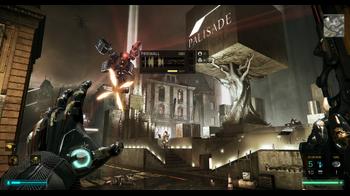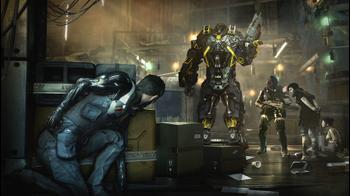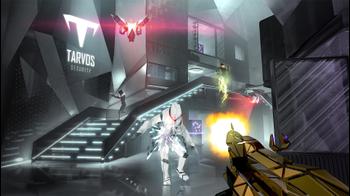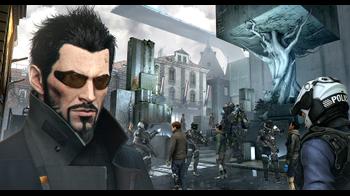
Deus Ex: Mankind Divided Review
Deus Ex: Mankind Divided is the hardest type of game to review. It pushed its way into my heart early on but later on takes a few difficult, stumbling steps that are hard to ignore. How exactly do you marry those two concepts? Worse, how do you score it?
Development on Mankind Divided must have been difficult for its team on two key fronts. Its greatest strength is also a weakness: it has a strong legacy thanks to two important predecessors, the original groundbreaking Deus Ex and the franchise-reviving Human Revolution. This legacy provides a great gameplay template to follow but also sets significant precedents that the game must also adhere to, thus making it sometimes difficult for Mankind Divided to find new things to bring to the table.
It's confident in how it approaches this conundrum and makes a compelling case: the formula is so good that they don't need anything new and shiny - they just need to carefully refine. Human Revolution is a hell of a game, and a great modern take on the ideas behind the original classic. Mankind Divided takes basically every system and mechanic it offered, adjusting and tweaking it for maximum fun and to give players a broader range of opportunity.
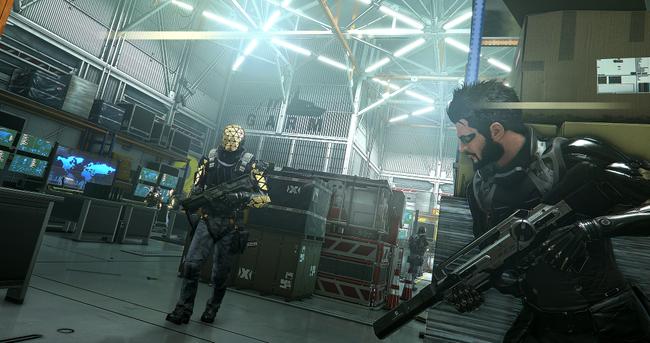
The menu is reminiscent of Human Revolution, the HUD elements are effectively identical and protagonist Adam Jensen's core augmentations are likewise happily featured as they were. There's of course a few all-new skills too, but even they are relatively natural expansions and additions from Adam's previous skill set.
If it ain't broke don't fix it, so the saying goes - the Deus Ex formula is good, so let's stick with it. This is mechanically a better expression of the same ideas that made Human Revolution great. It's a better game in almost every way.
While systems haven't changed much, other quality-of-life changes such as improvements to weapon handling in combat to bring the still slightly clunky feel closer (but still not equal) to a true action game and larger levels that allow for more open-ended stealth experimentation do a great deal to change the game for players in both the non-lethal stealth and guns-blazing camps.
Some of Human Revolution's weird hang-ups remain too. The menus still feel a little sluggish. It still isn't very seamless and seems to visibly switch between 'modes'. A stealth takedown for instance triggers a quick fade to black before you see the takedown animation, then a fade back to black afterwards, and then back to gameplay. It's the same any time even a minor cutscene has to take place. These are minor things that barely dent my enjoyment, but this slight unsightliness is curious and I wonder why it's necessary.
While Deus Ex is strongly focused on action and stealth, it's still rich in RPG mechanics. It's ultimately all about choice. The ultimate core choice is one that trickles down into everything you do - what type of guy you want Adam Jensen to be.
My main build in my main save was a fairly weak Jensen. I didn't invest in health or armor upgrades or even weapon stability. Instead I gave Jensen active camoflauge, maximum hacking skill, and several skills designed to aid stealth and non-lethal takedowns.
I love playing this game in this way, spending most of my time using X-ray vision to find ventilation shafts to crawl through to circumvent security. Several of the all-new abilities including remote hacking and a very Dishonored-feeling dash move became particularly useful to me in the back half of the game.
It's equally viable to go the complete opposite path or anything in between, and it in turn feels like a true action RPG. When Jensen's all-new augmentations are unlocked they come with a very RPG choice: unlock one and you'll have to permanantly deactivate another to avoid a system overload. The game forces hard choices, though it does also give you a chance to reverse some of the damage via a sidequest if you're so inclined.
If you can hack, no door will ever pose a significant issue. If you lack hacking, you might be able to double jump your way to a vent or window to crawl in. Security cameras can be shot out or hacked remotely or directly to turn them off depending on your chosen skills. You could even use your super strength to pick up an object to toss at the camera. I used a box even more smartly too - by dropping a box in the line of sight of a camera it became ideal cover to hide from it.
The choices matter, and there's quite a lot of depth hidden away beneath the surface. I love it, and I can see myself replaying the game with an entirely different build in the near future - the hallmark of a strong RPG character growth system.
The conversation-based mini boss battles return where through choices you try to persuade somebody to your line of thinking, and you're given plenty of times to respond to dialogue to give your Adam a voice that generally falls into one of three basic camps. It all works great, and though it's not exactly the most nuanced conversation system in the world it certainly fits with Deus Ex and the broader strokes of Adam's character.
Also vital is your choice of equipment, with weapons able to be upgraded and switched between multiple ammo types in a particularly slick interface. Looting enemies becomes vital not only for things you'll use, but for junk to sell back to stores in order to afford better upgrades.
All of these mechanics also show up in Breach, a new bite-sized mode that pits you against mini challenge maps that are divorced from the main story. This adds some value to the package and adds a solid pick up and play option, though its Tron-esque 'inside the computer' visuals aren't nearly as interesting as the world built in the game proper. Breach is a nice bonus, but the core game is what I'm there for.
The other major component that makes Mankind Divided such a joy is its level design. Its single city hub of Prague is a joy. It might not be the largest RPG landmass in size but makes up for it in density. One major building such as the bank or an apartment block could be explored for hours, with every room containing something to do no matter how small: Items to grab, computers to hack, emails to read.
The Deus Ex team talk a lot about the act of crafting a world, and Mankind Divided does a magnificent job of convincing you that one exists beyond its fairly narrow confines. Jensen is based out of Prague and unlike the globe-trotting Human Revolution you only leave there a couple of times. None of that matters though: every location feels well built and special.
Prague in particular is as much a star of the game as Jensen is; it's the poster-boy for the social tension the game is keen to depict and changes over the course of the game in some decently significant ways. The world Eidos Montreal has built offers up the best storytelling in the game.
Part of that is down to the strength of the world building, but an equal part is the weakness of this narrative. It starts strong but appears to lose steam fairly early on. This gives way for players to find the energy to explore the world and the side quests (which themselves feel far more tightly written), but compared to Human Revolution's thrilling story this one feels lacking.
There's two main issues with the narrative. The first is its real-world parallel that swaps racial tension for tension between augmented people and regular humans - as a plot element, it falls flat. The intent is for the game to have some teeth and have a message, but it fails to do so. It's not really clear if the game simply has nothing to say or if Eidos was too scared to directly say much of anything for fear of offending somebody.
Further, Adam Jensen - a rich white guy with an abundance of power via a job at Interpol and friends in high places - isn't a great character through which to experience an allegory for racism. You see people on the street being harassed, but any time a cop approaches Jensen he simply flashes his paperwork and sends them packing. He can run around the streets with a gun out without causing alarm. The trouble dissipates. The impact is gone.
The second problem is one of pacing, or potentially of sequel ambitions. After a bombastic opening and a plodding set up finally things begin to hit their stride and find a solid tempo. You fly out on one exciting mission, then another... and then it's over. Plot threads are left to dangle and unlike Human Revolution which had a rocky but absolute ending it's clear this story will be continued in sequels, and in turn feels unfinished here. As a stand-alone product it's disappointing.
It's only this that holds Deus Ex: Mankind Divided back from being an all-time classic to me. Considering it's a game so clearly about a richly designed and considered world, how flat its story remains is astonishing. But then you find other stories: the hidden details in emails and tucked away in world design, references to the original Deus Ex and so on.
Best of all are the stories you craft yourself: the moments when excellent level design meets great stealth and a badass-feeling set of character skills. Some games boast flair through scripted cinematic sequences, but Deus Ex is at its best when you're in control of its mechanics and making its world react to you.
Almost as if aware of this, included are two new menu options that are more gameplay-focused. Breach mode is a challenge-mode style set of missions that basically strip out the RPG stuff and put you in control of a gradually-evolving Jensen in various situations that challenge your use of his abilities. There's even leaderboards to track your performance against that of your friends.
Another option, Jensen's stories, offers smaller bite-sized one-shot stories for Adam - one currently, but more will presumably be added as DLC. These are nice, though I'm honestly at a loss as to why they're not in the main game. Both of these options are solid additions but neither fill the gap the roughness in the story leaves - for the single player campaign is truly what Deus Ex is all about.
When Mankind Divided's gameplay comes together it's an incredible experience. Excellent level design, diverse character skills and generally very tight gameplay design combine to make for a thrilling experience that takes place in a fantastically built world. The core story told within that world this time feels like a weaker one and ends even more weakly still, but that can't drag how impressive Mankind Divided feels to actually play.
